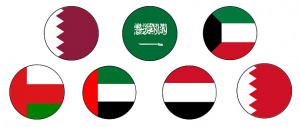Language/Gulf-arabic/Grammar/Pronouns
Hi Gulf Arabic learners! 😊
In this lesson, we will be discussing pronouns in Gulf Arabic grammar. Pronouns are an essential part of the language, as they are used to refer to people, things, and ideas in place of their names. They make up a significant part of everyday conversation, so it is essential to learn how to use them correctly. By the end of this lesson, you will be able to use and understand pronouns in Gulf Arabic conversations.
Subject Pronouns
Subject pronouns in Gulf Arabic replace the subject of a sentence. They are similar to English subject pronouns and include:
| Gulf Arabic | Pronunciation | English |
|---|---|---|
| أنا | ana | I |
| أنتَ | anta | You (masculine) |
| أنتِ | anti | You (feminine) |
| هو | huwa | He |
| هي | hiya | She |
| نحن | nahnu | We |
| أنتُمَا | antuma | You both |
| أنتُم | antum | You all (masculine) |
| أنتُن | antun | You all (feminine) |
| هم | hum | They (masculine) |
| هن | hun | They (feminine) |
Dialogue
- Person 1: أنا أحمد. (I'm Ahmed.)
- Person 2: أنتَ من أين؟ (Where are you from?)
- Person 1: أنا من الإمارات. (I'm from the United Arab Emirates.)
Object Pronouns
Object pronouns in Gulf Arabic replace the object of a sentence. They are similar to English object pronouns and include:
| Gulf Arabic | Pronunciation | English |
|---|---|---|
| ني | ni | Me |
| ك | ka | You |
| كَ | ki | You (feminine) |
| هو | huwa | Him |
| هي | hiya | Her |
| نا | na | Us |
| كما | kuma | You both |
| كم | kum | You all |
| هم | hum | Them |
| هن | hun | Them |
Dialogue
- Person 1: أنا أدرس العربية. تساعدني؟ (I'm studying Arabic. Can you help me?)
- Person 2: بالتأكيد، سأساعدك. ما الذي يحتاج إليه؟ (Sure, I'll help you. What do you need?)
- Person 1: أحتاج إلى كتاب. هل لديك واحدًا؟ (I need a book. Do you have one?)
- Person 2: نعم، لدي كتابًا. أعطيك إياه. (Yes, I have a book. I'll give it to you.)
Possessive Pronouns
Possessive pronouns show ownership or possession. They replace nouns and function like adjectives. Possessive pronouns in Gulf Arabic include:
| Gulf Arabic | Pronunciation | English |
|---|---|---|
| لي | li | Mine |
| لَكَ | laka | Yours (masculine) |
| لَكِ | laki | Yours (feminine) |
| لهُ | lahu | His |
| لَهَا | laha | Hers |
| لنا | lana | Ours |
| لكما | lakuma | Yours (dual) |
| لكم | lakum | Yours (masculine plural) |
| لكن | lakun | Yours (feminine plural) |
| لهم | lahum | Theirs (masculine) |
| لهن | lahinna | Theirs (feminine) |
Dialogue
- Person 1: هذا دفتري. (This is my notebook.)
- Person 2: هل هذا بيتكم؟ (Is this your house?)
- Person 1: لا، هذا ليس بيتي. (No, this is not my house.)
Demonstrative Pronouns
Demonstrative pronouns point to a specific noun in a sentence. They are similar to English demonstrative pronouns and include:
| Gulf Arabic | Pronunciation | English |
|---|---|---|
| هذا | hadha | This (masculine) |
| هذه | hadhihi | This (feminine) |
| ذلك | dhalika | That (masculine) |
| تلك | tilka | That (feminine) |
| هؤلاء | ha'ula'i | These (masculine) |
| هؤلاءِ | ha'ula' | These (feminine) |
| أولئك | 'ula'ika | Those (masculine) |
| أولئكِ | 'ula'ik | Those (feminine) |
Dialogue
- Person 1: ما هذا؟ (What is this?)
- Person 2: هذا هاتفي. (This is my phone.)
- Person 1: ما ذلك؟ (What is that?)
- Person 2: ذلك سيارة أخي. (That is my brother's car.)
Interrogative Pronouns
Interrogative pronouns are used to ask questions. They include:
| Gulf Arabic | Pronunciation | English |
|---|---|---|
| مَا | ma | What |
| مَنْ | man | Who |
| أَيْنَ | ayna | Where |
| كَمْ | kam | How many/how much |
| مَتَى | mataa | When |
Dialogue
- Person 1: أين المطعم؟ (Where is the restaurant?)
- Person 2: المطعم قرب المستشفى. (The restaurant is near the hospital.)
- Person 1: متى تمصّلين العشاء؟ (When do you usually have dinner?)
- Person 2: غالبًا ما نتناول العشاء بعد المغرب. (We usually have dinner after sunset.)
To improve your Gulf Arabic Grammar, you can also use the Polyglot Club website. Find native speakers and ask them any questions!
Sources
➡ If you have any questions, please ask them in the comments section below.
➡ Feel free to edit this wiki page if you think it can be improved. 😎
Related Lessons
- Gender
- Questions
- Plurals
- Conditional Mood
- Give your Opinion
- How to Use Have
- How to Use Be
- Personal Pronouns
- Negation
- Adjectives

